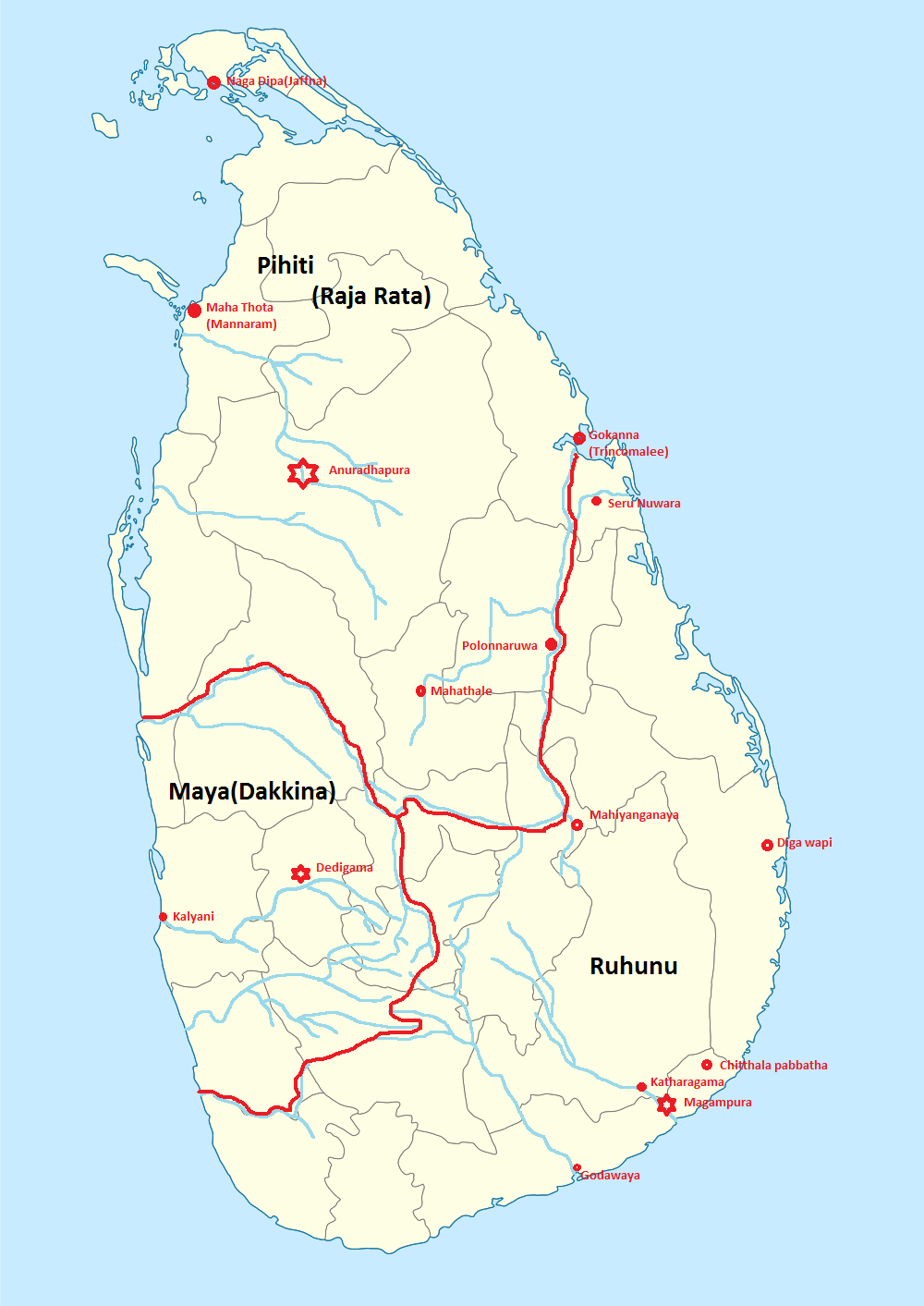|
Parakrama Bahu
Parākramabāhu I ( Sinhala: මහා පරාක්රමබාහු, 1123–1186), or Parakramabahu the Great, was the king of Polonnaruwa from 1153 to 1186. He oversaw the expansion and beautification of his capital, constructed extensive irrigation systems, reorganised the country's army, reformed Buddhist practices, encouraged the arts and undertook military campaigns in South India and Burma. The adage "Not even a little water that comes from the rain must not flow into the ocean without being made useful to man" is one of his most famous utterances. In 1140, Parakramabahu following the death of his uncle, Kitti Sri Megha, Prince of Dakkinadesa, ascended the throne of Dakkhinadesa. Over the next decade, improved both Dakkhinadesi infrastructure and military. Following a protracted civil war, he secured power over the entire island around 1153 and remained in this position until his death in 1186. During Parākramabāhu's reign, he launched a punitive campaign against t ... [...More Info...] [...Related Items...] OR: [Wikipedia] [Google] [Baidu] |
Kingdom Of Polonnaruwa
The Kingdom of Polonnaruwa ( si, පොළොන්නරුව රාජධානිය, Polonnaruwa Rājādhaniya) was the Sinhalese kingdom that expanded across the island of Sri Lanka and several overseas territories, from 1070 until 1232. The kingdom started expanding its overseas authority during the reign of Parakramabahu the Great. It had a stronghold in South India since its involvement in a civil war in the Pandya country. During this war, Pandya Nadu was seized as a province administered by the military of Polonnaruwa. The tributaries of the Chola empire, Tondi and Pasi, also came under its military rule. Rameshwaram was under Sinhalese rule until 1182. Its currency ''Kahapana'' was struck in these provinces. During the occupation of South India, construction works were undertaken. Despite being a kingdom, it had been under the control of its royal military, which captured power twice and remained dominant in politics. Other militaries also had captured power i ... [...More Info...] [...Related Items...] OR: [Wikipedia] [Google] [Baidu] |
Parakrama Samudra
Parakrama Samudra (or King Parakrama's sea or the Sea of King Parakrama) is a shallow reservoir (wewa), consisting of five separate wewa (reservoirs) (thopa, dumbutulu, erabadu, bhu, kalahagala tanks) connected by narrow channels in Polonnaruwa, Sri Lanka Sri Lanka (, ; si, ශ්රී ලංකා, Śrī Laṅkā, translit-std=ISO (); ta, இலங்கை, Ilaṅkai, translit-std=ISO ()), formerly known as Ceylon and officially the Democratic Socialist Republic of Sri Lanka, is an .... The northernmost reservoir is the oldest and referred to as ''Topa wewa'' (Sinhalese wewa is almost equal to English word lake or reservoir, but used unique Sri Lankan technology) built around 386 AD. The middle section ''Eramudu wewa'' and the southernmost portion, at the highest elevation, is ''Dumbutula wewa'', both sections were added and the reservoir expanded during the reign of King Parâkramabâhu I. [...More Info...] [...Related Items...] OR: [Wikipedia] [Google] [Baidu] |
Olive Branch
The olive branch is a symbol of peace and victory associated with customs of ancient Greece and connected with supplication to gods and persons in power. It is found in most cultures of the Mediterranean basin and became associated with peace in the modern world. Ancient Greece and Rome In Greek tradition, a ''hiketeria'' (ἱκετηρία) was an olive branch held by supplicants to show their status as such when approaching persons of power or in temples when supplicating the gods. In Greek mythology, Athena competed with Poseidon for possession of Athens. Poseidon claimed possession by thrusting his trident into the Acropolis, where a well of sea-water gushed out. Athena took possession by planting the first olive tree beside the well. The court of gods and goddesses ruled that Athena had the better right to the land because she had given it the better gift. Olive wreaths were worn by brides"Olive branch". ''The Oxford English Dictionary'', online ed., 2004(subscripti ... [...More Info...] [...Related Items...] OR: [Wikipedia] [Google] [Baidu] |
Chola Map
The Chola dynasty was a Tamils, Tamil thalassocratic Tamil Dynasties, empire of southern India and one of the longest-ruling dynasties in the history of the world. The earliest datable references to the Chola are from inscriptions dated to the 3rd century BCE during the reign of Ashoka of the Maurya Empire. As one of the Three Crowned Kings of Tamilakam, along with the Chera dynasty, Chera and Pandya dynasty, Pandya, the dynasty continued to govern over varying territories until the 13th century CE. The Chola Empire was at its peak under the Medieval Cholas in the mid-9th century CE. The heartland of the Cholas was the fertile valley of the Kaveri River. They ruled a significantly larger area at the height of their power from the later half of the 9th century till the beginning of the 13th century. They unified peninsular India south of the Tungabhadra River, and held the territory as one state for three centuries between 907 and 1215 CE.K. A. Nilakanta Sastri, ''A Histo ... [...More Info...] [...Related Items...] OR: [Wikipedia] [Google] [Baidu] |
Kingdom Of Ruhuna
The Principality of Ruhuna, also referred to as the Kingdom of Ruhuna, is a region of present-day Southern and Eastern Sri Lanka. It was the center of a flourishing civilisation and the cultural and economic centres of ancient Sri Lanka. Magama, Tissamaharama and Mahanagakula (now called as Ambalantota) were established here. The kingdom of Ruhuna was an important state in Sinhalese history as it was known for several rebellions against the superior states in Rajarata. The principality was defeated with its last de-facto Queen Sugala been captured and executed by the invading army of Parakramabahu I. Following its annexing by Parakramabahu, the rebellions that arose were suppressed. History Founding Ruhuna was founded around 200 BC by Prince Mahanaga, brother to Devanampiya Tissa of Anuradhapura, after a personal dispute. This region played a vital role in building the nation as well in the establishment of Buddhist culture. Significance The kings of Anuradhapura and th ... [...More Info...] [...Related Items...] OR: [Wikipedia] [Google] [Baidu] |
|


.jpg)

